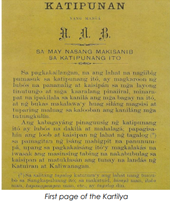According to historian, The Kartilya is the best known of all Katipunan text and that is the only document of any length set in print by the Katipunan prior to August 1896 that is known to be still extant. The Kartilya was printed as a small pamphlet that was distributed to the members of the Katipunan. Its term was derived from the Spanish cartilla which was the primer used for grade schools during the Spanish period. And like the cartillas, this document served as a primary lesson for the members of Katipunan.
The Kartilya presents not only the teachings for the neophyte Katipunero but also the guiding principles of the society. These teachings are expected from the members even after the attainment of freedom from the colonizers. The Kartilya ends with a document of affirmation by the member to the society’s teaching.
The Kartilya was not just a document for the Katipunan. Its importance today is predicted on the teachings that embodied the moral and nationalistic principles of the nation that fought for independence. These principles are relevant as the sense of nationhood still holds true when the cultural and historical values of every Filipino are threatened by onslaught of foreign influences brought about by today’s globalization.

About the Author

Emilio Jacinto was born on December 15, 1875 in the district of Trozo in Tondo, Manila. • He was the son of Mariano Jacinto, a bookkeeper, and Josefa Dizon.
Living a life of poverty, Jacinto still managed to get a good education. He finished his elementary education in a private school then took up his secondary education at the Colegio de San Juan de Letran. He later studied law at the University of Santo Tomas where he developed a love of reading and improved his skills in Spanish.
Unfortunately, he had to stop his studies when the Philippine Revolution began in 1896. • In 1894, Jacinto joined Katipunan at the age of 18 and took the symbolic name Pingkian. It was during this time that he developed his nationalistic ideals.
Through his enthusiasm and ideas, he became a guiding light to the members of the society.
He wrote the Kartilya as well as the oath of the Katipuneros.
He also edited the Katipunan newspaper, Kalayaan, and was the author of several literacy writings using the pen-name “Dimas Ilaw.”
He served the Katipunan in different capacities such as secretary, fiscal, editor, and later was appointed General by Bonifacio in 1897.
He also served as an adviser to the Supremo.
He died on April 6, 1899 because he, unfortunately, contracted malaria in the town of Majayjay.
Teachings of the Katipunan of the Sons of the People
1. A life that is not dedicated to a great and sacred cause is like a tree without a shade, or a poisonous weed.
The first highlights the significance of living life with a purpose. This tenet actually defines what life is. Life is a gift given to everyone that must be treasured by making it meaningful through setting up goals and achieving it no matter how hard it is.
2. A good deed lacks virtue if it springs from a desire for personal profit and not from a sincere desire to do good.
The second rule is about doing what is right. There are certain things in life that would make others proud because of you but sometimes it’s done just to be popular. Everyone must bear in mind that doing good must be accompanied with humbleness. A deed that is done must be because of what someone really feels like doing to help other people.
3. True charity resides in acts of compassion, in love for ones fellow men, and in making true reason the measure of every move, deed, and word.
The third shows what the true meaning of kindness is. It only means that having an open hand to give help without expecting in return is one of the best example to show an act kindness.
4. Be their skin dark or pale, all men are equal. One can be superior to another in knowledge wealth and beauty… but not in being.
The fourth rule highlights equality among people. Status and Identity will never be the reason for unequal treatment of people. Whether they are Filipinos or not, rich or poor, men or women, and white or black, nobody deserves to be discriminated.
5. A person with a noble character values honor above self-interest, while a person with an ignoble character values self-interest above honor.
The Fifth shows what honor should mean for a Katipunero.
6. An honorable man’s word is his bond.
The sixth is about doing the “walk the talk” concept or putting into action the words that has been promised.
7. Don’t waste time; lost wealth may be recovered, but time lost is lost forever.
The seventh rule gives importance to how we manage our time and give our best like tomorrow ends because time is as precious as a gold.
8. Defend the oppressed and fight the oppressor.
The eighth lesson simply tells everyone to fight for what is right and fight with the person who is at the right side.
9. An intelligent man is h who takes care in everything he says and keeps quiet about what must be kept secret.
The ninth is about the significance of trust that everyone must know how to keep confidential things in order to keep the trust that other people give.
10. Along the thorny path of life, the man leads the way and his wife and children follow. If the leader goes the way of perdition, then so do those who are led.
The tenth principle is all about being able to lead the family.

Nicee well done dear😊 keep it up😉